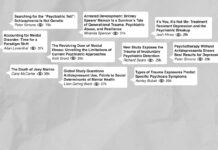 This week on MIA Radio, we interview Dr. Russell Razzaque. Dr Razzaque currently works as a consultant psychiatrist and associate medical director in east London and, together with colleagues, he is leading a pioneering multi-centre Open Dialogue pilot in the UK National Health Service.
This week on MIA Radio, we interview Dr. Russell Razzaque. Dr Razzaque currently works as a consultant psychiatrist and associate medical director in east London and, together with colleagues, he is leading a pioneering multi-centre Open Dialogue pilot in the UK National Health Service.
In 2014 he released his book Breaking Down Is Waking Up in which he explores alternative views of mental distress, their relationship to consciousness and comparisons to forms of spiritual awakening.
In this interview, we discuss the relationships between mindfulness, Acceptance and Commitment Therapy and Open Dialogue and how the UK NHS is approaching the world’s first randomised controlled trial of Open Dialogue interventions for people struggling with emotional or psychological distress.
In this episode we discuss:
- What led Dr. Razzaque to his interest in psychiatry and in particular some of the more unconventional aspects of the profession.
- How beginning to practice mindfulness nearly 20 years ago led to Russell starting to feel an incongruence between the dominant philosophy in psychiatry and what he was learning from his own mindfulness practices.
- That the dominant philosophy is one of trying to help people remove their pain and remove them from difficult and uncomfortable experiences, but in his own personal development, he was learning to sit with the pain and finding that valuable.
- How this led to an interest in novel therapeutic approaches like Acceptance and Commitment Therapy, originally pioneered by professor Stephen Hayes.
- That Russell felt disillusioned with the way that UK mental health services and systems were organised and realised that creating better outcomes for people would require system-wide change.
- How Russell came to be one of the leading figures in the worlds first multi-centre, fully randomised Open Dialogue Trial which seeks to establish the evidence base for Open Dialogue.
- That the trial involves eight NHS Trusts across the UK and that several hundred practitioners have already been trained in Open Dialogue therapy.
- That during the trial there will be randomly selected postcodes receiving Open Dialogue interventions compared with randomly selected postcodes receiving treatment as usual and that the results will be compared after three years.
- That this trial will allow us to answer questions about the efficacy of Open Dialogue because we will have built a strong evidence base.
- How colleagues have reacted to the Open Dialogue trial and why some might be threatened by the need to change.
- That Open Dialogue is a need-adapted approach, so it is not fundamentally against any of the conventional interventions, but it encourages people to make their own choices, so medication use tends to significantly reduce.
- That it is necessary to change the power dynamic in current systems and approaches because the current methods lead to dependency, whereas Open Dialogue is about empowering and liberating the individual.
- That Russell is encouraged to find that many psychiatrists are willing to open up to new ways of thinking about mental and emotional distress.
- How spirituality and psychiatry can work hand-in-hand and how accepting spiritual explanations can sometimes lead to better understanding of personal experiences.
- That, in future, the system needs to change such that interpersonal relationships are put first and are seen as the key to successful outcomes.
- That we also need to adapt so that clinicians are trained to be present with distress and not just try to remove it.
- How people can hear Russell speak at the upcoming Compassionate Mental Heath event in South Wales, being held on April 25th and 26th 2018.
Relevant links:
To get in touch with us email: [email protected]
© Mad in America 2018















Thanks James and Dr Russell,
There are lots of solutions out there.
Anxiety is always “real” when its active, but it’s possible to know from experience that “sitting with feelings” works.
If a person sits with their feelings until the feelings soften their minds can find guidance to problems from within the problems themselves. A friend of mine in 12 Step Fellowship calls this the Helicopter View.
The only snag is that feelings of anxiety don’t soften easily!
Report comment
Thanks for listening Fiachra.
Report comment
It’s a fantastic initiative and exciting to see in our NHS. How we need it. Some NHS psychiatrists are still spouting poppycock about chemical imbalances that drugs correct, and how “all the evidence suggests you can’t recover on psychotherapy alone”. There are lots of Victorian doctors out there willing this to fail, it has to work. I would urge you to consider the model of treatment adolescents receive also.
Report comment
Thank you for listening, as you say, it is great to hear that the NHS, cash-strapped as it is, is still willing to trial and understand new approaches.
Report comment
It’s really great, and I hope everyone gets behind them to show there is another way and people can start thinking positively.
Report comment
Think about the money Open Dialogue + Other Successful initiatives would ultimately save!
Report comment
Fiachra
I do think it would save money in the end, simply because more people would get over their troubles quicker.
The current system seems to want to create a chronic illness out of a crisis.
Report comment
ConcernedCarer,
According to Professor Martin Knapp of the London School of Economics:- Each Severely Mentally Ill Person costs the UK about £65,000 per year.
If a person lives for 40 years after diagnosis this would amount to 40 × £65,000 equalling a Lifetime Total Cost per Severely Mentally Ill Person of £2.6 million.
So, it makes sense to move to Recovery Approaches that can be demonstrated to work.
Report comment
Alternatively, breaking down is breaking down. And waking up is waking up.
Report comment
Incidentally, waking up is often a very, very unfortunate state of being.
Many people that supposedly wake up, wake up into rather perverse ideologies and some of these people then go on to spree killing.
Waking up independently is often the road to ruin.
Report comment